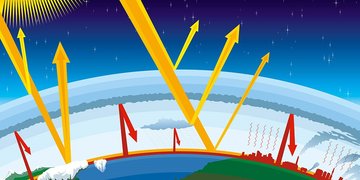Why is the Climate Changing
The atmosphere is composed of a type of gas that traps heat in the atmosphere more – greenhouse effect.
Human activities such as burning fossil fuels for transportation, industrialization, and mining cause greenhouse gas emissions, which in turn trap more heat in the atmosphere. These human activities emit more gases, which in turn trap more heat in the atmosphere.
The result is a rise in the global average temperatures over time – This rise in global average temperature is called global warming.
The rise in global average temperatures impacts weather patterns differently and the cascading impacts are extreme and erratic weather patterns.

The greenhouse effect is a natural process that warms the Earth's surface. When the sun's energy reaches the Earth, some of it is reflected back into space and the rest is absorbed, warming the planet.
The Earth then radiates some of this heat back into space, but certain gases in the atmosphere, such as carbon dioxide and methane, trap some of this outgoing heat, preventing it from escaping completely. This trapped heat keeps the Earth's temperature at a level suitable for life, creating the greenhouse effect.
However, human activities, such as burning fossil fuels and deforestation, have significantly increased the concentrations of these greenhouse gases in the atmosphere. This makes the greenhouse effect stronger thus trapping more heat. This leads to a rise in global temperatures and contributes to climate change, with consequences like more frequent and severe heatwaves, storms, and other extreme weather events.
Average Rating: ☆ ☆ ☆ ☆ ☆ (0 reviews)


